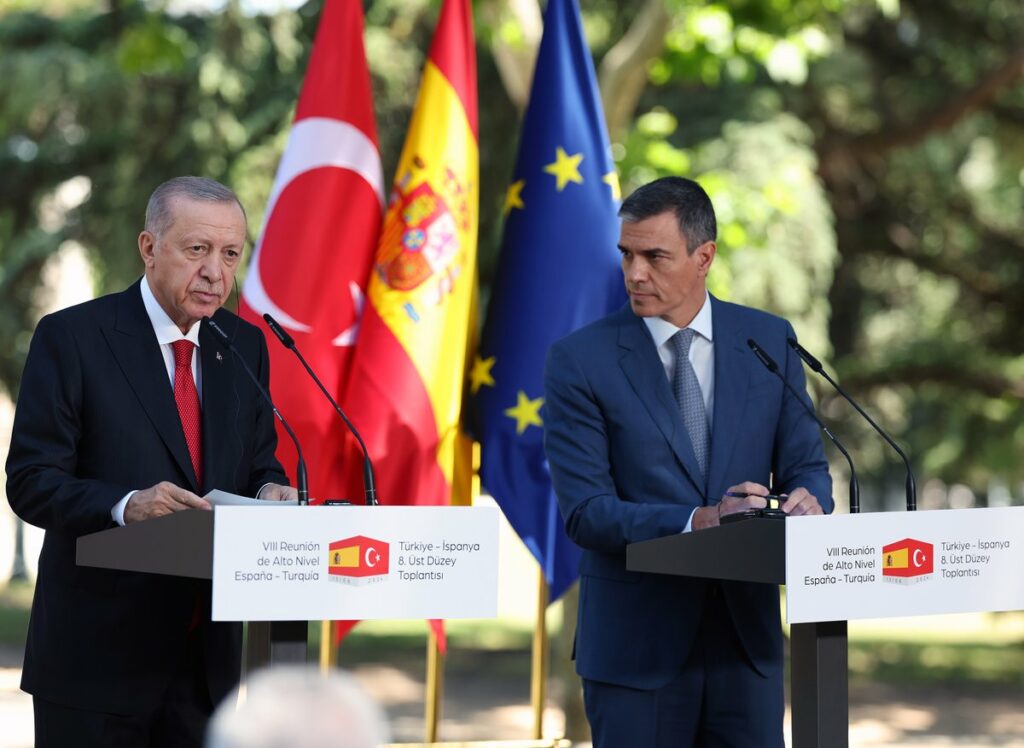Turkish President Recep Tayyip Erdoğan reprimanded a Spanish journalist for “defending terrorists” when asked about European Court of Human Rights (ECtHR) rulings Turkey has ignored regarding Selahattin Demirtaş and Osman Kavala during a joint press conference with Spanish Prime Minister Pedro Sanchez.
Erdoğan’s response came during the eighth Turkey-Spain Intergovernmental Summit held in Madrid on Thursday. The Turkish president’s remarks were directed at a journalist from the Spanish El Pais daily, who raised concerns about the continued imprisonment of Demirtaş and Kavala despite ECtHR decisions calling for their release.
“Turkey is a state of law,” Erdoğan said. “Regarding the individuals you mentioned, our judiciary has made its decision within our legal framework.” He claimed that one of these individuals, referring to Demirtaş, “was responsible for the death of over 100 young people” and “caused deaths in the southeast through terrorism.”
Erdoğan scolded the journalist, saying, “It deeply saddens us that a journalist would defend these terrorists in such a way.”
“You probably don’t live in Turkey. We live in Turkey. These steps were taken to ensure peace in the region and will continue in this manner,” Erdoğan added, telling the journalist “not to shake your head” during his remarks.
Demirtaş, former co-chairperson of the pro-Kurdish Peoples’ Democratic Party (HDP) and also a human rights lawyer, has been behind bars since November 2016 on politically motivated charges.
Kavala, 66, faced charges that have ranged from espionage and financing protests in 2013 to taking part in a failed coup against Erdoğan in 2016. He was arrested in October 2017 and sentenced to life in 2022 for allegedly trying to topple Erdoğan’s government.
In its 2020 ruling on Demirtaş, the ECtHR said his “unjustified” detention pursued the ulterior motive of stifling pluralism and limiting freedom of political debate in Turkey.
In the same year the court said in another ruling that Kavala’s “unjustified and extended” detention had the ultimate purpose of reducing him to silence.
The Council of Europe’s Committee of Ministers launched an infringement proceeding against Turkey over its treatment of Kavala on February 2, 2022. This could potentially see Ankara expelled from the continent’s leading human rights organization.
Turkey’s continued detention of Kavala and Demirtaş has drawn widespread criticism from human rights organizations and international observers. Critics argue that the Turkish judiciary is being used to suppress dissent and silence political opposition. Erdoğan’s government maintains that it is “combating terrorism.”
Instances of Erdoğan publicly scolding journalists are not uncommon. In September Erdoğan rebuked American journalist Amna Nawaz from PBS during an interview in New York, where he attended the UN General Assembly. Nawaz questioned Erdoğan about the politically motivated arrests of Kavala and Demirtaş. Erdoğan denied responsibility by invoking the independence of the judiciary and rebuked Nawaz for interrupting him.
Similar incidents have occurred at domestic and international events, reinforcing Erdoğan’s reputation for being intolerant of critical media scrutiny.
Rights groups routinely accuse Turkey of undermining media freedom by arresting journalists and shutting down critical media outlets, especially since President Erdoğan survived a failed coup in July 2016.
Turkey, which has been suffering from a poor record of freedom of the press for years, ranks 158th among 180 countries in RSF’s World Press Freedom Index published on May 3 on the occasion of World Press Freedom Day.

